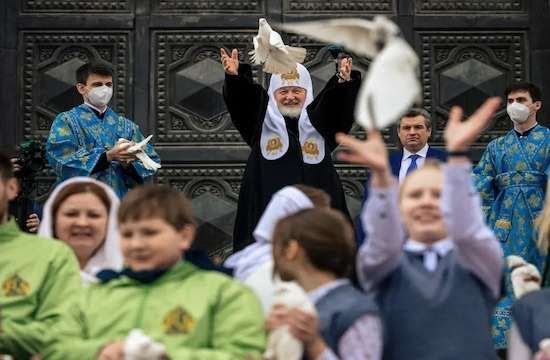European ecumenical chief urges Kirill to condemn invasion
Head of the Conference of European Churches, an ecumenical body born after World War II, says the various Christian denominations cannot remain silent in the face of Russian aggression.

Orthodox Patriarch Kirill, in Moscow, April 7, 2021. (Photo by DIMITAR DILKOFF/AFP)
The Reverend Christian Krieger is convinced that the Christian Churches and communities across Europe should be speaking out and challenging the Moscow Patriarchate to take a firm stand against the Russian invasion of Ukraine.
"The ideology pursued by the Russian president is fully reflected in some of Patriarch Kirill's statements," says Krieger, a 58-year-old French Reformed theologian."I wanted to remind (the patriarch) that Christian identity is beyond our national and cultural identities," he says.
Krieger was elected in 2018 as president of the Conference of European Churches (CEC), an organization that emerged in the 1940s and 50s after the ravages of World War II. The organization includes some 114 Orthodox, Protestant, and Anglican churches from all countries of the Old Continent.He told La Croix's Xavier Le Normand that Christians across Europe have a duty to pray and work for peace at this time.
La Croix: How does ecumenism contribute to peace building?Christian Krieger: The Conference of European Churches (CEC) was created in 1959 and aims to promote ecumenism and peace on the European continent. It was born from the ruins of a Europe ravaged by the two world wars.At the time, people wondered how the barbarity of the trenches and the horror of the Nazis could have been committed by countries that, although not Christian, were at least were mostly Christian.
History shows us that ecumenism is one of the conditions for peace: being Church with other Churches, which are also recognized as expressions of the Church of Jesus Christ.This allows us to nourish our own prayer, theology, and faith. It also allows us to realize how religious, cultural, and national identities overlap. It can help us to see them in their proper place. We are then better able to share an ethos of peace and reconciliation.From the point of view of faith, I believe that this mechanism of recognizing the difference of the other allows for a better ability to live the Gospel.Today, we are in the midst of a conflict...Yes, and this war is unsettling, shaking a certain number of our certainties. It is very complicated for certain Churches or certain ecclesial circles to position themselves.
This raises the serious question of a just war: is it justifiable to use violence to respond to violence?This question is directly addressed to us, since sending arms to Ukraine is also contributing to violence, and therefore endorsing it.Activists for non-violent action are wondering how to communicate these convictions.Without having an answer, I believe that we must live with these questions. No one can speak of peace today without the shadow of conflict looming over them.You have written to the Orthodox Patriarch of Moscow, Kirill, asking him to "recognize the aggression, call on the political leaders of your country to end the war and resume the path of diplomatic dialogue and international order". Why did you take this initiative?
I wanted to invite him to take a clear position in the face of an aggression that I would never have imagined possible today. I have the feeling that the Patriarchate of Moscow is experiencing an isolation equal to the isolation of those who wage war.The ideology pursued by the Russian president is fully reflected in some of Patriarch Kirill's statements. To be a Church with other Churches – that is, to be part of an ecumenical relationship – makes it possible to cut short this type of self-understanding. Faced with the risk of isolation, even splintering, I wanted to remind him that Christian identity is beyond our national and cultural identities.As CEC, we must also have a certain political activity and it seems to me that it was our mission to challenge the patriarchate in the face of this conflict which shakes many certainties.The ecumenical movement can call for a broad and representative Christian voice and can launch a challenge that should carry a certain weight.
I believe that the ecumenical movement must play this role.In view of Kirill's recent statements, which seem to legitimize Russian aggression, don't you fear that your efforts are useless?I believe that the patriarchate is challenged by many of its own nationals, especially in the diaspora, but also by Metropolitan Onufriy of Kyiv, primate of the Ukrainian Orthodox Church that is attached to Moscow (UOC-MP). Moreover, I believe that the position of the patriarchate will be seriously questioned at the next assembly of the World Council of Churches, scheduled to take place in Karlsruhe (Germany) at the end of summer.Sometimes you have to take the risk that an action will be in vain. In the Gospel of Luke, Christ says that "if these keep silent, the stones will cry out" (Lk 19, 40).We must act with our convictions.
We have a duty to speak out; the Church cannot remain silent in the face of such aggression.To the duty of praying is added the duty to ask questions. Moreover, while doing justice in the present situation, we must already prepare for the future.In the time of war, we must prepare for the time of peace.We must be careful not to demonize the whole of Russia and all Russians. We must begin asking ourselves what we want to write as history for the post-conflict period.


 Votes : 0
Votes : 0









